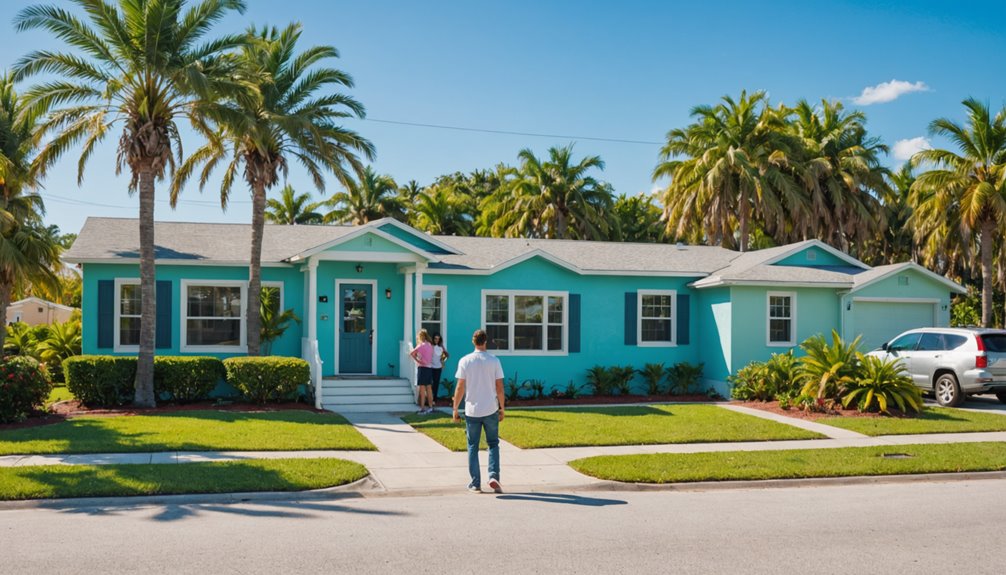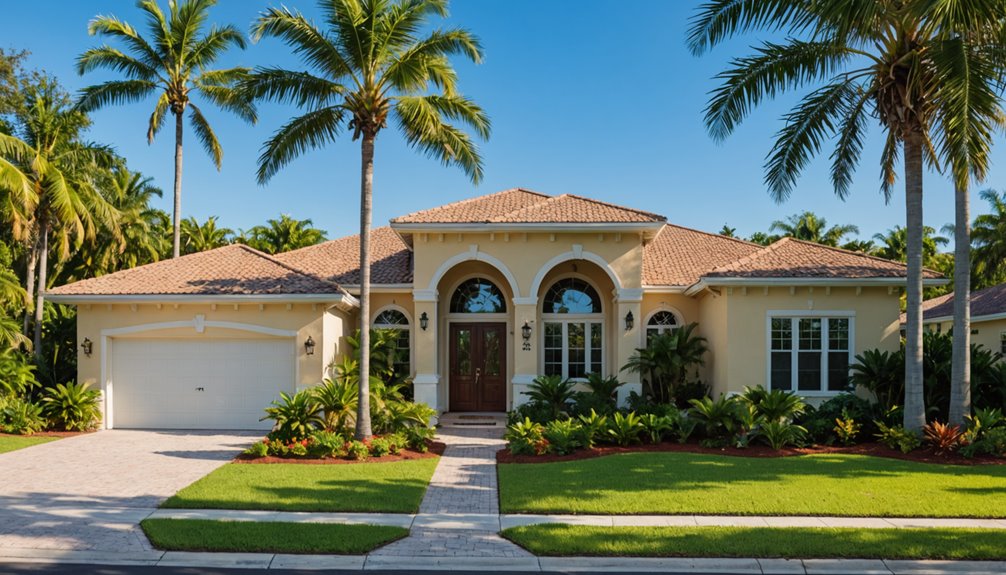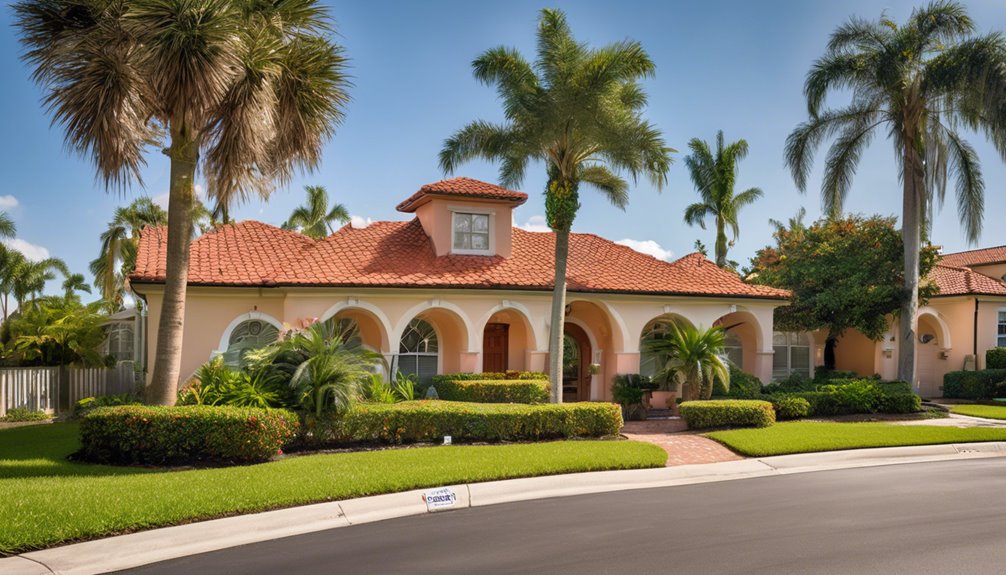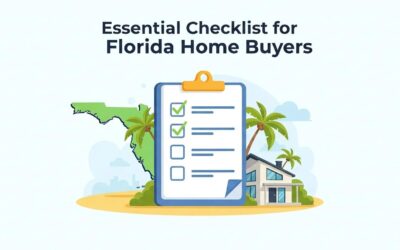First-time buyers in Florida should start by understanding the eligibility requirements, including income limits and a minimum credit score of 640 for FHA/VA loans. Investigate down payment assistance programs, such as FL Assist, which offers up to $10,000—complete the mandatory homebuyer education courses for valuable insights. Compare loan options and interest rates, ranging from 6.58% to 7.19% for 30-year fixed terms. Stay informed on regional housing initiatives. Uncover more strategies to secure your dream home with further investigation.
Key Takeaways
- Verify the income limits and credit score requirements to determine eligibility for Florida’s first-time buyer programs.
- Explore down payment assistance options, such as FL Assist or county-specific programs, for support with upfront costs.
- Compare loan options and interest rates, such as FHA or VA, to find the best fit.
- Complete mandatory homebuyer education courses through HUD-certified agencies for valuable insights and assistance.
- Gather essential documents, such as W-2s and bank statements, to ensure a smooth application process.
Understanding Eligibility Requirements for First-Time Buyers
How can initial-time home buyers in Florida navigate the complex landscape of eligibility requirements? Navigating Florida’s housing market requires a clear understanding of stringent criteria, including income thresholds such as $118,000 in Miami-Dade and credit score minimums of 640 for FHA/VA loans. Buyers must verify that properties are their primary residences, meet the ownership gap requirement of three years, and comply with county-specific rules. Mandatory homebuyer education courses in areas like Pinellas, alongside pre-approval letters and detailed documentation, are non-negotiable steps. For those who are enthusiastic about joining Florida’s vibrant homeowner community, mastering these requirements is the gateway to success. With diligence and preparation, applicants can confidently align with program standards, securing their place in a supportive network of fellow first-time buyers. Additionally, many assistance programs in Florida, such as Florida First and Hometown Heroes, offer valuable resources to help buyers navigate these challenges with financial support options. To enhance their search, buyers should also investigate local assistance programs that provide further financial aid.
Exploring Down Payment Assistance Options in Florida
Why do so many inaugural-time home buyers in Florida struggle with the upfront costs of purchasing a property? For many, saving for a down payment feels like an insurmountable barrier, particularly in a competitive market. Thankfully, Florida offers diverse down payment assistance programs to bridge this gap, welcoming buyers into the county’s homeownership. Options Escambia’s and Charlotte County’s Purchase Assistance, as well as Escambia’s $7,500 deferred loans, provide vital support. Additionally, programs such as Charlotte County’s SHIP Program offer up to 10% of the purchase price to assist income-eligible applicants with their homeownership journey. Exploring no-money-down mortgage options can further enhance the affordability of homeownership for many buyers.
| Program | Support Offered | Impact on Dfamily’s |
|---|---|---|
| Ward County | Down payment & closing | A family’s primary home |
| Escambia County | Up to $7,500 loan | Stability for generations |
| Hillsborough HHF | Aid for savings-short | Hope amidst struggle |
| Jacksonville H2H | Closing & down payment | Belonging in a neighborhood |
These programs, paired with mandatory workshops, enable buyers to achieve their dreams.
Navigating Income and Purchase Price Restrictions

Initial-time home buyers in Florida, having investigated down payment assistance options, must also navigate the intricate landscape of income and purchase price restrictions to qualify for these crucial programs. Income limits, based on Area Median Income (AMI), vary by county and household size, ranging from $40,350 for a single person at 50% of the AMI to $182,640 for larger families at 120% of the AMI. Additionally, awareness of market trends is crucial as it can influence the availability of eligible properties. Purchase price caps stand at $544,232 in non-target areas, rising to $665,173 in designated target zones. These thresholds ensure that aid reaches those most in need, while regional adjustments provide flexibility. By understanding these criteria, buyers can confidently align their financial profiles with the program requirements, thereby joining a community of successful homeowners in Florida’s diverse housing market. Additionally, specific county limits, such as those in Miami-Dade or St. Johns, must be reviewed to ensure eligibility for assistance programs.
Choosing the Right Loan Program for Your Needs
First-time home buyers in Florida must carefully investigate loan options, such as government-backed FHA, VA, or USDA loans, as well as conventional programs like HFA Preferred, to find the best fit for their financial situation. Comparing interest rates, such as Pinellas County’s 6.50% for FHA loans versus 7.0% for HFA Advantage, is crucial to securing favorable terms over the life of the mortgage. Furthermore, evaluating eligibility criteria, including income caps and credit score requirements, guarantees buyers qualify for the most beneficial programs and assistance. Additionally, exploring down payment assistance programs can help overcome financial barriers to homeownership. Understanding the importance of credit scores can also play a crucial role in determining the most advantageous loan options available.
Explore Loan Options
As prospective homebuyers in Florida embark on their journey, understanding the array of loan options available becomes a crucial step in securing the right financing. Government-backed loans, such as FHA, VA, and USDA loans through Florida Housing, offer fixed 30-year terms, often with down payment assistance of up to $10,000 via Florida Assist, welcoming first-time buyers and veterans. Conventional options, such as HFA Preferred and Freddie Mac HFA Advantage, cater to low- to moderate-income households with strict credit and income requirements. Programs like Hometown Heroes support frontline workers with up to $35K in aid. Additionally, the Florida Housing Homebuyer Loan Program offers various options for first-time buyers, ensuring accessible homeownership opportunities. Current inventory levels are increasing, allowing buyers more choices and flexibility in securing financing. Mandatory homebuyer education ensures readiness, while targeted incentives, such as MCC tax credits, ease the burden. Joining this community means finding a tailored loan to call Florida home.
Compare Interest Rates
Navigating the home-buying process in Florida requires a keen focus on interest rates, a crucial factor after exploring loan options. For novice buyers seeking a sense of community, understanding current trends is essential. As of July 2025, 30-year fixed rates range from 6.58% to 7.19%, while 15-year fixed rates offer lower interest at 5.86% to 6.44%. Adjustable-rate mortgages start at 6.08% but carry future uncertainty. With Florida rates mirroring national averages, local lender competition can yield better offers. Buyers should weigh the stability of fixed rates against the flexibility of ARMs, considering their long-term goals. Strategic rate-locking, guided by market forecasts predicting stabilization near 6.5% by late 2025, can help safeguard against volatility, providing Florida’s residents with a secure path to homeownership within the state’s vibrant neighborhoods. Additionally, comparing rates and terms from multiple lenders is crucial to securing the most favorable mortgage offer, as well as comparing lender rates. Furthermore, assessing market trends can provide insights into the best times to secure a loan and make an offer.
Assess Eligibility Criteria
When navigating the home-buying process in Florida, prospective buyers must carefully evaluate the eligibility criteria to select the most suitable loan program for their needs. Understanding income caps, credit score minimums (like 640 for FL Assist), and debt-to-income limits is essential. Programs often require mandatory homebuyer education and enforce primary residence rules, ensuring buyers are prepared and committed. Additionally, working with an agent can provide valuable market insights that help buyers navigate these eligibility requirements more effectively.
Joining this community of homeowners means aligning with specific guidelines. It’s also important to note that assistance for down payment and housing costs is available only with Florida Housing’s first mortgage loan. Review the table below for key criteria across Florida programs, and take the initial step toward your dream home with confidence.
| Criteria | Details |
|---|---|
| Income Caps | Vary by program/household size |
| Credit Score Minimum | 640 (FL Assist), 660 (Pinellas) |
| Down Payment Assistance | Up to $10k (FL Assist), $5k (HAMI) |
| Property Location | Must be in designated areas |
| Homebuyer Education | Mandatory via approved agencies |
Comparing Interest Rates and Loan Terms
How can novice home buyers in Florida navigate the complex world of mortgage options with confidence? By comparing interest rates and loan terms, they can secure a deal that aligns with their financial goals. Current rates show a 30-year fixed mortgage at 7.19%, surpassing the national average of 6.75%. Meanwhile, a 15-year fixed mortgage stands at 6.44%. Fixed rates offer stability, unlike adjustable-rate mortgages, which provide initial savings but carry future uncertainty. Government-backed FHA (6.85%) and VA (7.14%) loans ease access for those with lower credit, while jumbo loans at 6.81% suit pricier properties. With forecasts predicting rates between 6.3 and –6.5% by year-end 2025, buyers should act strategically. Joining this informed community ensures smarter, more tailored decisions for your dream home in Florida. Additionally, having professional representation can significantly enhance the negotiation process, providing buyers with secure, favorable terms and incentives.
Gathering Essential Documentation for Your Application

Navigating the mortgage application process in Florida requires meticulous preparation, especially when gathering the necessary documentation. First-time buyers must compile financial proof, including a valid pre-approval letter, W-2 forms, recent tax returns, and paycheck stubs to demonstrate income stability. Driver’s license verification requires copies of driver’s licenses, birth certificates, or passports for all household members. Employment records, such as signed verifications within 30 days and 1099 forms for contractors, are essential. Asset and debt documentation, such as bank statements and lists of obligations, alongside proof of exceptional circumstances, like Social Security award letters, completes the package. Assembling these documents with precision ensures a smoother application process, allowing buyers to join the vibrant community of Florida homeowners with confidence and clarity.
Leveraging Regional Housing Programs Across Florida
As first-time homebuyers in Florida navigate the path to ownership, tapping into regional housing programs can provide essential financial support. These initiatives, which blend federal, state, and local funds, target income-eligible applicants with benefits such as down payment assistance and closing cost coverage. From Palm County’s $100,000 per household to Orange County’s tiered aid ($10,000-$70,000), opportunities abound for those meeting the criteria, such as Area Median Income limits and a primary residence in Florida.
Explore key programs below to join Florida’s homeownership community:
| Region | Key Assistance Feature |
|---|---|
| Palm Beach County | Up to $100k per household |
| Pinellas County | Home Key Plus additional mortgage |
| Orange County | Tiered support: $10k to $70k |
Act swiftly—slots are limited, and belonging awaits!
Completing Homebuyer Education and Counseling

For first-time homebuyers in Florida, completing a pre-purchase homebuyer education course is a crucial step toward securing ownership and accessing financial assistance. These courses, approved by Florida Housing or HUD, equip buyers with vital knowledge that is available online or in person through HUD-certified agencies or local governments. Certificates, valid for two years, often provide access to down payment assistance, particularly in counties like Pinellas or Hillsborough.
Join a community of informed buyers by understanding the value of this education:
- Empowerment: Gain confidence with financial and homeownership insights.
- Access: Qualify for county-specific assistance programs.
- Connection: Network with local resources and approved lenders.
- Support: Benefit from tailored guidance in targeted regions.
Seize this opportunity to establish a solid foundation for a successful home-buying experience in Florida.
Planning for Primary Residence and Ownership Rules
When embarking on the journey of homeownership in Florida, initial buyers must carefully consider the rules surrounding primary residence and ownership to maximize benefits and comply with state regulations. Establishing a primary residence provides homestead protections and tax exemptions, which require an intent to reside permanently, ownership, and a formal declaration with the county appraiser by January 1st of the tax year. Understanding Florida’s requirements is crucial for joining Florida’s homeowner community. Review this guide to navigate the process seamlessly:
| Aspect | Requirement | Benefit |
|---|---|---|
| Homestead Eligibility | Permanent residence intent | Asset protection |
| Tax Exemption | Title ownership by January 1st | Up to $50k exemption |
| Residency Proof | Florida voter registration | Legal recognition |
| Documentation | Florida ID, Social Security numbers | Exemption processing |
| Inheritance Rules | Transfer to spouse/minor child | Retained exemptions |
Staying Updated on Federal and State Housing Initiatives

Beyond mastering the basics of homeownership rules, primary-time buyers in Florida must stay informed about federal and state housing initiatives to optimize available financial support. Programs like the HOME Investment Partnership, offering up to $100,000 in Palm Beach County, and Florida Housing First Mortgage with down payment aid, can ease the path to ownership. Staying updated ensures access to tailored options, such as Hometown Heroes for public servants or HFA Pathways for assistance with closing costs.
Key reasons to stay engaged include:
- Unlocking Grants: Secure substantial aid, such as Florida Assist, to fill funding gaps.
- Meeting Deadlines: Avoid missing limited application windows.
- Accessing Priority: Qualify for targeted area benefits or profession-specific programs.
- Building Community: Join a network of supported homeowners through shared resources.
Frequently Asked Questions
How Do I Find Florida Home Listings?
To find home listings, one can investigate platforms such as Zillow and Realtor.com for comprehensive data. Utilize advanced filters, set alerts, and partner with agents for MLS access, ensuring a connected, informed search experience.
What Are Closing Costs in Florida?
Imagine a financial horizon shimmering with hidden fees. Home costs in Florida, averaging 2-5% of a home’s price, encompass title insurance, taxes, and more. Join savvy buyers by thoroughly understanding these essential expenses.
Can I Buy a Fixer-Upper Home?
One can indeed purchase a fixer-upper home, embracing a rewarding opportunity. With strategic financing and renovation planning, they join a community of savvy buyers turning potential into profit through dedication and vision.
How Long Does Home Buying Take?
The home-buying timeline typically spans 2 to 6 months, depending on the level of preparation, market conditions, and the loan processing process. For a smoother experience, it is essential to plan diligently and collaborate with trusted professionals in the field.
Are There Home Inspection Requirements?
Regarding home inspection requirements, they are not mandated by state law. Buyers can negotiate inspection clauses in contracts, ensuring peace of mind. Joining this informed community means prioritizing optional yet critical properties.
Conclusion
As the sun sets over Florida’s palm-fringed horizons, inaugural buyers stand at the threshold of a dream—homeownership. With eligibility understood, assistance investigated, and loans secured, they can almost feel the key in hand, releasing a future of stability. By leveraging regional programs and staying informed about housing initiatives, Florida is not just a home, but a legacy. Let Florida’s warm welcome guide them to the doorstep of endless possibility.
References
- https://themortgagereports.com/76236/who-qualifies-first-time-home-buyer
- https://pinellas.gov/programs/first-time-homebuyer-program/
- https://discover.pbc.gov/HED/Pages/HOME-First-Time-Homebuyer-Program.aspx
- https://www.makefloridayourhome.com/florida/down-payment-assistance/donald-trump-2024-first-time-homebuyer-program
- https://www.floridahousing.org/programs/homebuyer-overview-page
- https://www.fha.com/fha-grants?state=FL
- https://themortgagereports.com/33553/complete-guide-to-down-payment-assistance-in-the-usa
- https://www.orangecountyfl.net/NeighborsHousing/HomebuyerDownPaymentAssistance.aspx
- https://www.orlando.gov/Building-Development/Housing-and-Development-Grants-Incentives-and-Assistance/Housing-Assistance-Programs/Request-Down-Payment-Assistance
- https://www.tamarac.gov/443/Down-Payment-Assistance







